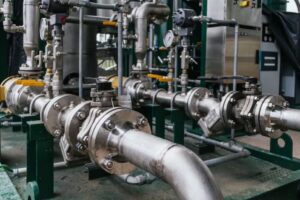The Oil & Gas industry, which is increasingly focused on innovation and efficiency, is finding chemical nickel plating an effective solution to many problems related to corrosion, wear and tear, and material resistance. In this article, we will explore the applications of chemical nickel plating in the Oil & Gas industry, analyzing how different types of companies can benefit from this technology.

Table of Contents
ToggleWhat is Chemical Nickel Plating?
Chemical nickel plating is a process of deposition of nickel on a metal surface through chemical rather than electrolytic reactions. This method results in uniform, adherent coatings that are perfect for components with complex geometries. The resulting coating improves corrosion resistance, wear resistance and can increase the life of the treated part.
Why is it Important in the Oil & Gas Sector?
Who can benefit?
Pipe and Pipeline Manufacturers: In oil and gas transportation, corrosion from water, salts and other chemicals is a constant problem. Chemical nickel plating protects the tubes, significantly extending their service life.
Mining and Drilling Companies: Equipment used in these environments is subjected to extreme conditions. Nickel plating increases wear and corrosion resistance, reducing downtime and maintenance costs.
Valve and Pump Manufacturers: These components require high corrosion resistance due to constant exposure to hydrocarbons and other aggressive chemical compounds.
Offshore Facility Construction Companies: Structures such as oil platforms are particularly vulnerable to marine corrosion. A chemical nickel plating treatment can significantly prolong its life.
Safety and Control Equipment Suppliers: Chemical nickel plating ensures that devices such as sensors, safety valves and control equipment are resistant to extreme environmental conditions.
Advantages of Chemical Nickel Plating
Corrosion Resistance: Effectively protects against corrosion caused by water, oils, gases and other chemicals.
Uniformity of Coating: Being a non-electrolytic process, chemical nickel plating can uniformly cover complex surfaces, providing homogeneous protection.
Durability: Significantly increases the life of treated components, reducing long-term costs associated with replacement and maintenance.
Wear Resistance: Improves the tribological properties of surfaces, making them more resistant to abrasion and erosion.
How is it positioned in the Current Market?
The demand for efficient anti-corrosion solutions such as chemical nickel plating is growing in the Oil & Gas industry. Increasing exploration and production activities in increasingly challenging environments require state-of-the-art materials and technologies to ensure reliability and safety. Companies that invest in this technology not only optimize the performance and durability of their equipment but also meet increasingly stringent environmental and safety standards.
Conclusions
Chemical nickel plating is proving to be an indispensable technology in the Oil & Gas industry. Its applications, ranging from the protection of pipes and valves to the preservation of entire offshore structures, offer practical solutions to the challenges imposed by a difficult and hazardous operating environment. Companies that integrate this process into their production systems not only gain in efficiency and durability but also contribute to the sustainability of the entire industry, a crucial aspect in the modern energy age.

